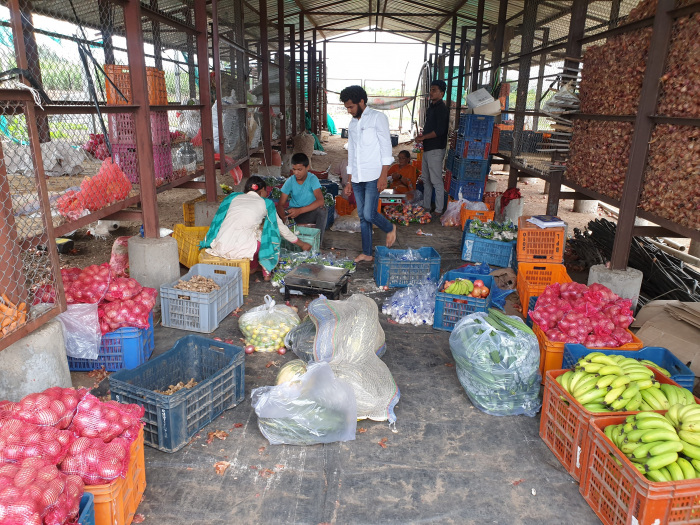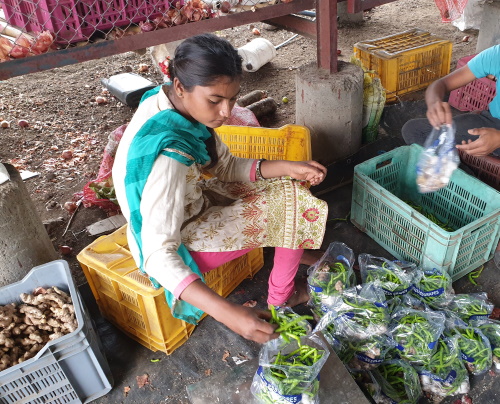
The challenge: There is both supply and demand of agricultural produce, but markets are closed and commodities cannot be traded.
On the 24th of March 2020, the Government of India announced a total lockdown in the country to control the increasing infection rates of the COVID-19 pandemic. During the following six weeks, markets were closed and thus, many farmers were not able to sell their farm produce, which led to substantial losses. Not only farmers suffered: the drop in supply caused skyrocketing prices and consumers had hard times to afford agricultural products. Therefore, a different type of sales market had to be developed.
The solution: Direct marketing without intermediaries
The director of the Krushi Navakalpana Farmer Producer Company (FPC), which is facilitated by the GIZ-funded Green Innovation Centre India project, came up with the idea to sell the farm produce directly to consumers to minimise the loss for farmers and to provide consumers with reasonably priced fresh products. In the frame of this “experiment”, a Farmer Study Group (FSG) that consists of 20 farmers was identified to sell their produce directly to the consumers through the FPC.

In this collection center, farmers come together and jointly sort, grade and pack their farm produce.
Photo© ETC India
Preparations for successful sales
An important condition for the successful sale was that the FPC did not charge any fees to the farmers for providing the direct marketing services as the members were already incurring losses. After some discussions, the FPC and the FSG agreed on the terms and conditions of the operation: farmers could only supply graded produce to the FPC, the FPC could in turn grade the produce before packaging itself and any of the out-graded produce would be returned to the farmers not paid.
Development of the “experiment”
A housing society in Pune (Maharashtra state) that wanted to purchase agricultural produce directly could be identified by the FPC. The farmers jointly created fruit and vegetable baskets in consultation with the housing society members after a collection centre had been provided by a member of the Farmer Study Group. In this centre, the vegetables were sorted, graded and packed on special tables that had been provided by the Green innovation centre India to improve the efficiency of the operation. The project also temporarily supported sourcing, supervision and marketing consultants. The first order was to supply 177 food baskets to the society at the price of INR 350 per basket (each weighs 10 kg). At the beginning of the trial, the farmers supplied produce once per week but later on, the frequency increased to twice a week. The feedback was very positive: the consumers started to refer new housing societies and the demand for the products started to increase.
What has been achieved so far …
Till date, the Farmer Producer Company has supplied more than 10,000 food baskets (100 Mt in total) to consumers in Pune City in Maharashtra with a total turnover of INR 3,500,000 (EUR 41.000).
…and what is next?
Good references from the clients are helping the Krushi Navakalpana Farmer Producer Company to build a brand in the mind of the prospective consumers. The demand is increasing and the FPC has decided to turn the experiment into an actual business. They commissioned a local company to develop an app that allows consumers to place individual orders.
This is part of the:
Green Innovation Centres for the Agriculture and Food Sector – India
One World – No Hunger Initiative
Commissioned by German Federal Ministry for Economic Cooperation and Development (BMZ)
Implemented by Deutsche Gesellschaft für Internationale Zusammenarbeit (GIZ) GmbH
For further information, please contact the Team Leader, Mans Lanting (mans.lanting [at] afci.de) or Johannes Geisen (johannes.geisen [at] afci.de).
